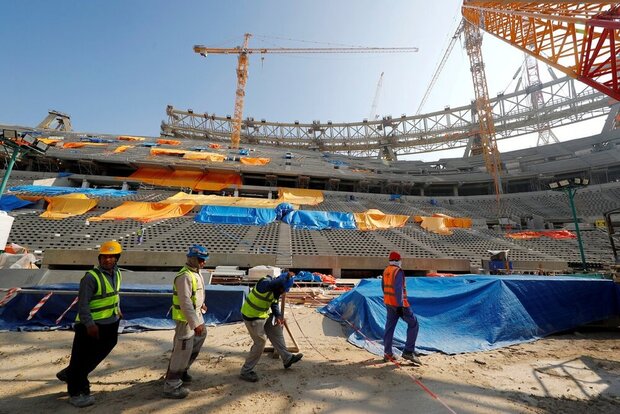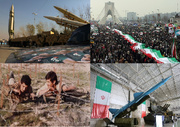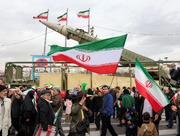PGCC members -- comprising of Saudi Arabia, the United Arab Emirates (UAE), Qatar, Bahrain, Kuwait, and Oman -- host the majority of the 23 million migrant workers living in Arab states, according to the International Labor Organization.
The appalling working and living conditions of migrant laborers in these states is nothing new. The situation has been criticized by Amnesty International in the past, now amid the novel coronavirus outbreak, the plight of the migrants has deteriorated.
They compose around half of the region’s population the migrant workers are mainly from India, Pakistan, Nepal, Bangladesh, the Philippines, and Egypt. They work for long hours for wages that are high only compared to back home but low by any other standards.
As the hostility towards foreigners is growing louder so are questions about how to replace them with locals.
Roughly two-thirds of PGCC nationals work for their governments, despite efforts to encourage them into the private sector. Companies are offered incentives to hire locally and charge expatriates extra taxes.
Xenophobia is escalating as expatriates are blamed for spreading the virus. Migrant labor camps are becoming coronavirus hot spots and citizens are demanding their government to protect them.
“What this crisis has really exposed is the systematic discrimination of the (Persian) Gulf,” said Hiba Zayadin, a regional researcher at Human Rights Watch. “It’s shown how terrible it can be for society as a whole.”
At the mercy of visa sponsors and politically connected visa brokers, few protections are available for migrant laborers. Employers can cut their wages with impunity. Whether they’ve lived for two months or two decades they are always considered “temporary” and left out of social contract.
The World Bank estimates that the global remittances will fall by about a fifth this year, from $714 billion last year to $572 billion.
Persian Gulf foreign workers sent more than $124 billion to their home countries in 2017. The UAE and Saudi Arabia were the world’s second and third-largest exporters of remittances after the US, according to World Bank data.
Now tens of thousands have lost their jobs during the lockdowns, leaving them to ration dwindling food supplies while their families back home struggle without their remittances.
The oil-dependent Persian Gulf countries are themselves grappling with falling incomes and budget deficits amid the pandemic. They can no longer guarantee the high living standards their citizens once took for granted.
Some countries have agreed to pay for repatriation flights. A few home countries are resisting because of the lack of resources to quarantine or care for returnees.
One exception is India, which has organized a huge evacuation effort aimed at bringing back thousands of Indians mainly from the Persian Gulf, reports The New York Times.
Indian government’s ‘Vande Bharat’ mission flights are evacuating stranded Indian nationals from countries affected by the pandemic.
The six Persian Gulf Arab countries have some eight million workers from India alone, of whom more than half are blue-collar workers.
India itself is grappling with tens of thousands of migrant workers returning from big cities to their villages after losing their jobs due to countrywide lockdown imposed in late March.
Here’s an overview of the situation in the region on a case by case basis:
UAE
According to 2018 World Bank data UAE has a population of 9.6 million. The Persian Gulf trade hub of Dubai had plans to host Expo 2020, which was scheduled to open in October and predicted to draw 25 million visitors. Now the event has been pushed back 12 months, joining a list of other events that have been postponed.
A mass exodus of expatriates – who make up the bulk of Dubai’s 3.3 million population – is expected. Many are now out of work, must continue to pay rent and now way to return home.
UAE has changed its law to allow companies to break work contracts, lower wages, and pressure foreign workers to take unpaid leave, reports German broadcaster, Deutsche Welle.
Foreigners account for 98 percent of Dubai’s private sector workforce, mainly migrant workers for south Asia. UAE has extended all residency visas until the end of the year, allowing redundant expatriates to look for work or wait for flights home to restart.
“We’re looking at a minimum population contraction of 10 percent for the year,” Nasser al-Shaikh, a former head of Dubai’s department of finance, tweeted in April.
The UAE stopped passenger air traffic – the lifeblood of the economy – in late March.
The second phase of repatriation flights to India began May 16 when three flights from Dubai and Abu Dhabi departed for Kerala.
Reconfirming the schedule of flights, the Consulate General of India on Friday tweeted, “We are happy that 11 Air India Express flights are planned to India from Dubai in the second phase of Vande Bharat Mission,” from May 16 and ending May 23. Repatriation flights to India began on May 7.
More than 40,000 Pakistanis in UAE have registered with consulates to return home. The first PIA flight carrying 227 passengers from Dubai left for Islamabad April 18.
UAE recorded its first case of Covid-19 at the end of January. By May 10 more than 17,000 cases and 185 deaths were reported by Johns Hopkins University.
Qatar
In 2010 Qatar was awarded the right to host the 2022 World Cup. With all the related construction and hospitality work migrant population has rapidly grown. The country’s population jumped from 1.6 million in December 2010 to 2.7 million in October 2018.
Amnesty International reports document the abuse and exploitation of low paid migrant workers extensively since the World Cup was awarded to Qatar.
In September 2018, Amnesty International published an investigation into an engineering company called Mercury MENA that left dozens of workers stranded and penniless, eventually forcing them to return home despite being owned thousands of dollars of wages and benefits.
Rooms in the so-called industrial area of Doha, where eight to ten people live at a time with little running water or sanitizing products.
As reports of widespread infections erupted parts of the industrial area was in complete lockdown.
According to Qatari government website new measures were introduced, with room occupancy limited to four people, hygiene product availability and wages, and treatment for the sick guaranteed.
Nevertheless, the condition of migrant workers in Qatar, one of the richest countries in the world, has deteriorated after the outbreak. According to a Guardian daily report many low-wage migrant workers in the country, desperate and unable to return home, have been forced to beg for food following a surge in the outbreak.
According to the Gulf Times, there are 29,425 positive cases to date in Qatar. With a population of 2.8 million, the total number of Covid-19 deaths has remained low so far at 14.
About 25 percent of those tested for the virus in the past week have been found to be effected. Home to two million immigrants, Qatar now has one of the highest rate of infection per capital in the world.
Kuwait
Kuwait state news agency KUNA reports that full curfew started on March 11, but people were allowed to leave home for two hours between 4:30 to 6:30 p.m. each day. Restrictions have started to ease now.
With a population of 4.6 million migrant workers make-up some two-third of the population or 3.3 million. The authorities offered amnesty for undocumented workers that they would be allowed re-entry if they volunteered for repatriation.
Thousands of workers who volunteered are now stranded in unsanitary detention camps with appalling conditions in the desert for over a month in four packed compounds on the outskirts of Kuwait City waiting to be repatriated. In such cramped up environment detainees are unable to practice social distancing.
Footage shows toilets overflowing with sewage, with detainees unable to wash their hands to lack of access to running water. Devoid of basic health care or communication network these migrants are prevented from leaving the compound.
Over 20,000 laborers, predominantly from Bangladesh, Egypt, India, Sri Lanka, and Sudan, are awaiting repatriation reports Middle East Eye. Delays have led to protests inside the camps with local authorities using tear gas and rubber bullets.
Kuwait has recorded 11,975 coronavirus cases and 88 deaths.
Bahrain
The 458,000 migrant workers comprise about 77 percent of the total workforce, public and private sectors. The health ministry in Bahrain announced that 90 percent of active coronavirus cases in the country were among migrant workers.
There are about 2,200 registered overcrowded and unsanitary labor camps in the country.
Labor and Social Development Minister Jameel Humaidan said the campaign aims to “reduce the numbers of employees in the camps.”
Thousands of migrants in Bahrain have been relocated to safe shelters this week, according to the Gulf Daily News, and plans were underway to move low-income workers and ease overcrowding in labor camps.
Bahrain has announced that it will cover medical expenses of all foreign workers infected with Covid-19.
An official at Bangladesh embassy in Manama reported on May 15 that some 7,000 to 8,000 Bangladeshi migrant workers in Bahrain have lost their jobs since shutdown was enforced in the country.
Bahrain’s Labor Market Regulatory Authority (LMRA) recently reported that due to the economic fallout some 10,000 job losses were incurred in the tiny Persian Gulf country.
The Dacca-based Daily star reported that Bahrain is home to about 150,000 Bangladeshis of which at least 12,600 undocumented migrant workers have so far applied to get regularized under the amnesty program declared by Bahrain government in early April.
As per Bahrain government’s estimate, currently, there are around 55,000 undocumented workers.
To date, Bahrain has 6,956 confirmed Covid-19 cases, 12 deaths, and 2,910 recoveries.
Oman
Oman’s Ministry of Health on Monday announced 193 new confirmed cases with Covid-19, out of which 72 were Omani nationals and 121 non-Omanis, reports the Oman Observer. A total of 1,496 patients in the Sultanate have recovered, the ministry said.
This brings the total number of cases in the Sultanate to 5,379, including 23 deaths.
As part of the Vande Bharat Mision, the fourth repatriation flight left Oman to India yesterday. As many as 177 passengers and five infants took off from Muscat airport to Hyderabad in the Air India Express flight.
On Sunday three new evacuation flights to Kerala were added to take-off this week.
At least 700,000 people working in Oman are believed to be affected after Oman asked firms to replace expats with locals, reports The Times of India.
Saudi Arabia
Since the beginning of 2017 more than 667,000 foreign workers left as the kingdom imposed higher fees on expatriates and companies that were grappling with sluggish economy laid off staff.
The higher fees on expatriates were imposed to make room for domestic labor to take a more active role in running the economy. But labor market surveys revealed that the Saudis are not filling the roles being vacated by foreigners as unemployment hit its highest on record at 12.9 percent in 2018.
Now with the Covid-19 pandemic, we are witnessing another wave of migrants returning home. Migrants account for a third of Saudi Arabia’s 33 million population and more than 80 percent of the private sector workforce.
Riyadh is unlikely to be able to keep providing free health care for foreigners as the kingdom itself is grappling with the fallout of low crude demand and due to travel restrictions the kingdom’s tourism industry, mainly based on pilgrimage, has suddenly shut down.
Strict lockdown measures were enforced that has shuttered many areas of economy, but businesses are eligible for government support to pay salaries.
Riyadh is stepping up the deportation of thousands of Ethiopians, including some who are suspected of suffering from coronavirus, an act that some migrant advocates have described as reckless and inhumane.
As many as 500,000 Ethiopians reside in the kingdom working in the construction industry, as maids or as animal herders. Some 300,000 Ethiopians had been repatriated during the past two years.
Ethiopia has requested that the deportations stop and on Saturday denied landing rights to the Saudi aircraft.
In its latest effort to wean the kingdom off the crude export revenue dependence the country has started to entice skilled foreign workers the kingdom has approved a new residency scheme.
The new law would offer two types of residencies: one would be permanent while the other could be renewed annually. The new program would allow expatriates to own property and offer other benefits. Details are to be published within the next 90 days.
By the last week of April Health officials confirmed 1,141 people tested positive for Covid-19 and the death tool stood at 114 while 1,812 had recovered.
First Published in the Tehran Times


























Your Comment